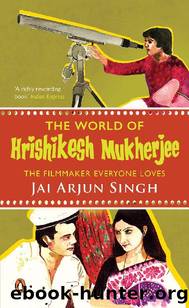The World of Hrishikesh Mukherjee by Jai Arjun Singh

Author:Jai Arjun Singh [Singh, Jai Arjun]
Language: eng
Format: epub
Publisher: Penguin Books Ltd
Published: 2016-09-21T00:00:00+00:00
If Anuradha had been a more self-consciously liberal workâone that tried to perform the function of granting the woman her autonomy no matter whatâit might have ended with the heroine leaving husband and daughter and going back to the city with Deepak (who tells her: âYour identity is not Mrs Nirmal Chaudhury, it is Anuradha Raiâ). But the AnuradhaâNirmal relationship is based on genuine love, and this is not a straightforward battle aganst the shackles of tradition. In fact, one of the most layered things about this film is the suggestion that Anuradhaâs father wants her to marry Deepak not just because it would be a socially desirable match, but because he believes (and he is probably right) that Deepak would be more appreciative of her music. It was she who chose Nirmal, knowing full well she might have to make sacrifices; what has affected her most is not so much the sidelining of her musical career but the simultaneous disappearance of another form of music in her lifeâher preoccupied husband now treats her as someone who merely runs the house. And the need for him to be more sensitive is addressed by the end of the film.
In my view, anyone who watches Anuradha should be able to see how clearly the film feels for its heroine. But for those who donât trust the vagaries of subjective analysis, there is a revealing behind-the-scenes story that suggests Hrishi-da knew where he wanted his audienceâs sympathies to lie. In her memoir Leela: A Patchwork Life, Leela Naidu recalls that Balraj Sahni attempted to get the filmâs ending changed so that Anuradhaâs plight was undermined and the doctor came off looking more considerate. Instead of the film closing with Anuradha sweeping the floor, tears in her eyes, Sahni suggested that she should ask her husband to get a kilo of tomatoes from the market. The implication is clear, and shows how a canny actor can gently alter a screenplayâs focus: such a scene would detract from the pathos of Anuradhaâs situation and make the doctor seem willing to be as sensitive as possible; it would necessitate a reaction shot where Sahni could use his acting chops to make his character look helpful and noble. But, as Naidu puts it, Hrishi-da (who was just two films old as a director, and might have been susceptible to being cajoled by someone of Sahniâs stature) saw through the suggestion and rejected it:
I never had to ask for tomatoes and was grateful that I didnât have to fight that one. Perhaps it had to do with the fact that Hrishida was a mathematician. That showed in his cutting of the shots, which was precise and economical. It also showed in the logic in the exposition of his films. If the film was called Anuradha and the internal struggle was Anuradhaâs against her circumstances, it seemed odd that it should end [in the way Balraj Sahni suggested]. [p. 62]
Download
This site does not store any files on its server. We only index and link to content provided by other sites. Please contact the content providers to delete copyright contents if any and email us, we'll remove relevant links or contents immediately.
The Fine Print (Dreamland Billionaires Book 1) by Lauren Asher(2548)
Fury of Magnus by Graham McNeill(2438)
The Last House on Needless Street by Catriona Ward(2382)
The Rose Code by Kate Quinn(2190)
A Little Life: A Novel by Hanya Yanagihara(2102)
Malibu Rising by Taylor Jenkins Reid(1902)
The God of the Woods by Liz Moore(1896)
Luster by Raven Leilani(1894)
Transcendent Kingdom by Yaa Gyasi(1850)
Moonflower Murders by Anthony Horowitz(1842)
The Lost Book of the White (The Eldest Curses) by Cassandra Clare & Wesley Chu(1683)
This Changes Everything by Unknown(1499)
The Midwife Murders by James Patterson & Richard Dilallo(1476)
The New Wilderness by Diane Cook(1436)
The Lying Life of Adults by Elena Ferrante(1425)
Wandering in Strange Lands by Morgan Jerkins(1407)
Written in the Stars by Alexandria Bellefleur(1391)
Ambition and Desire: The Dangerous Life of Josephine Bonaparte by Kate Williams(1380)
The Lying Life of Adults by Elena Ferrante;(1303)
